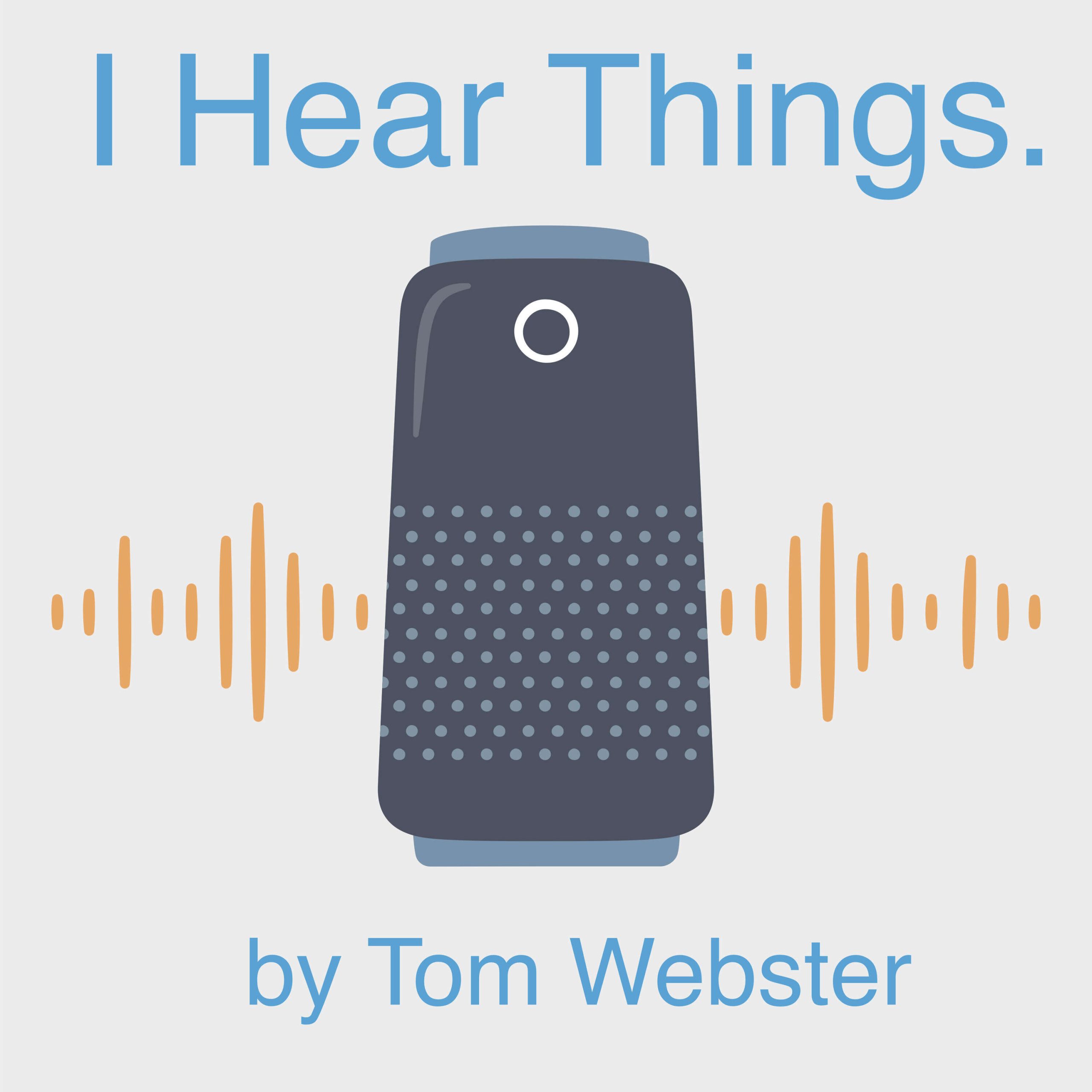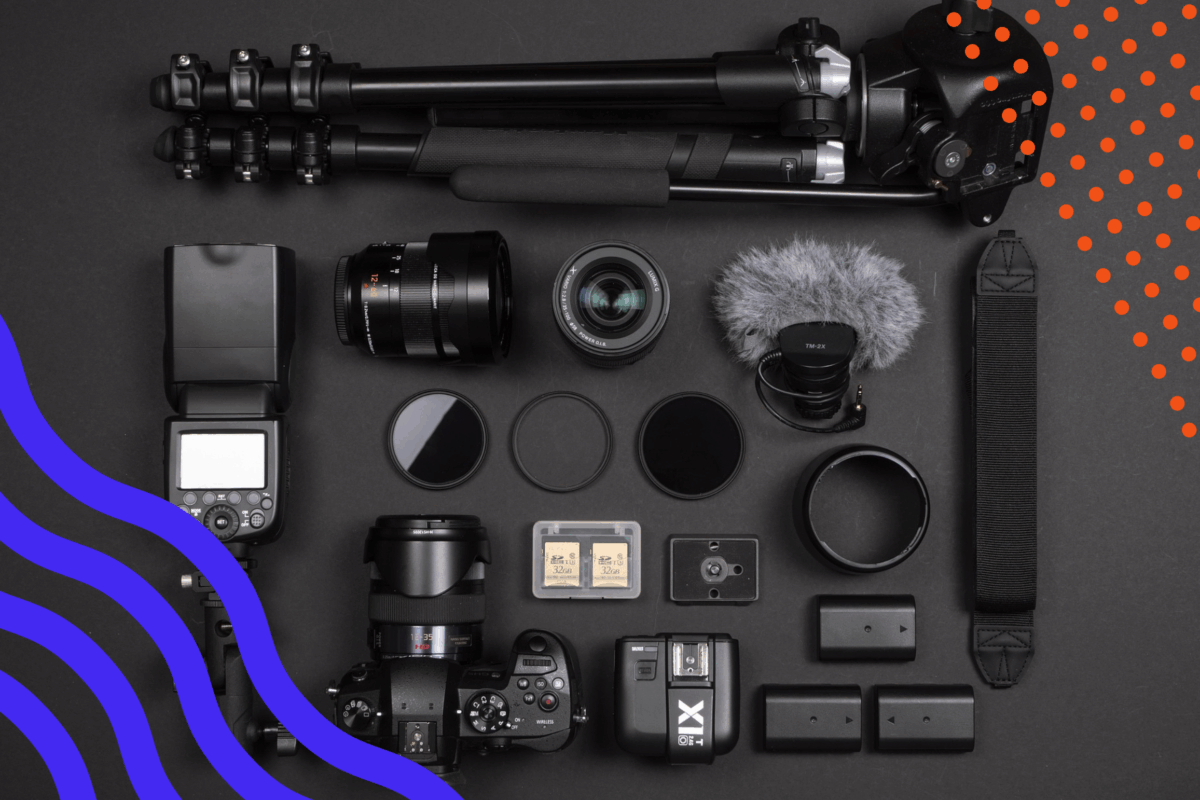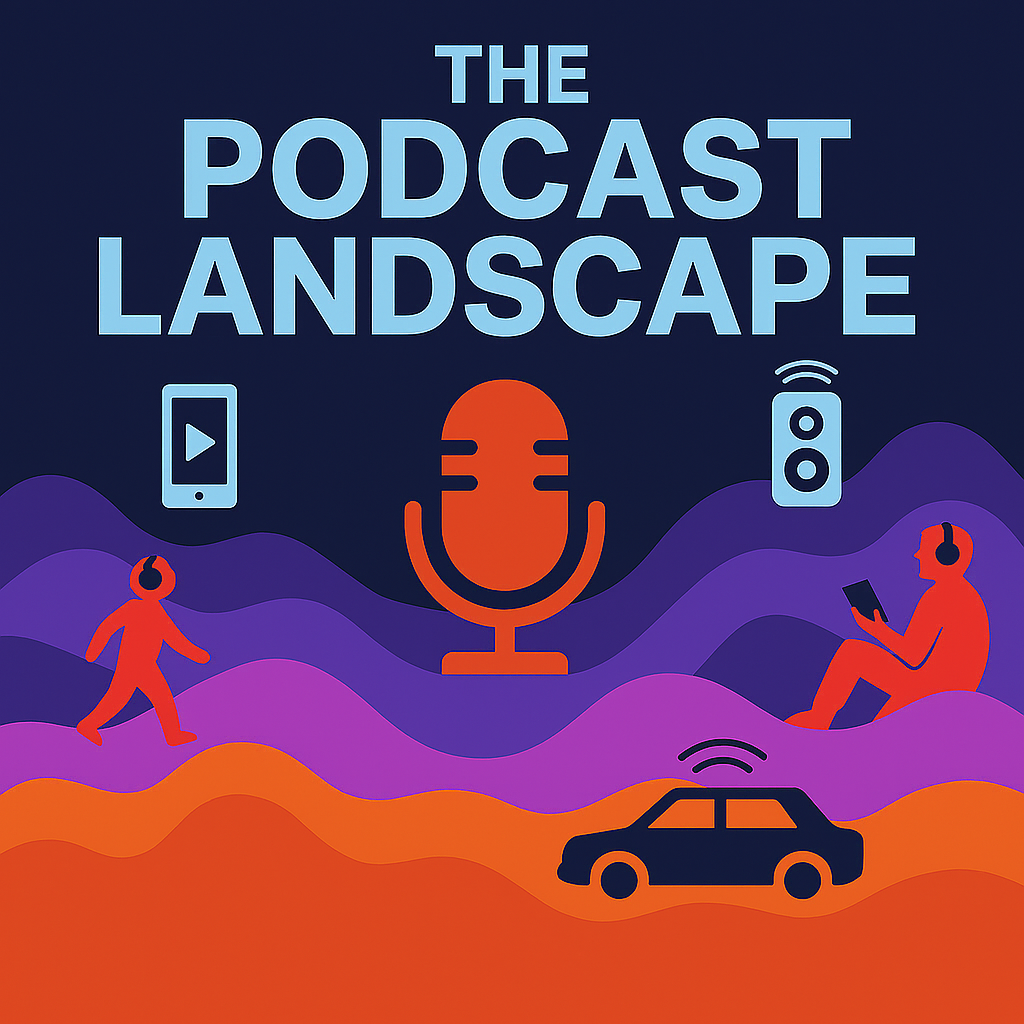00:00:03
Arielle Nissenblatt: Gathering and analyzing good data and what that means for the podcast industry. That's what we're talking about on this week's episode of Sounds Profitable: Adtech Applied with me, Arielle Nissenblatt.
00:00:12
Caila Litman: And me, Caila Litman.
00:00:14
Arielle Nissenblatt: Thanks to Podsights for sponsoring this week's episode. Podsights, podcasts, advertising, insights, and attribution. Built for advertisers, loved by publishers. Go to podsights.com for more information. Special thanks to our sponsors for making Sounds Profitable possible. Check them out by going to soundsprofitable.com and clicking on their logos in the articles.
Hey, Sounds Profitable. Welcome to the show. You did not hear Bryan's voice at the intro, and that is because today I am hosting the show, and I am interviewing Caila Litman. Caila, hey. How are you?
00:00:47
Caila Litman: I'm having one of those days that's good, because it's 2, 2, 2, 2, 2, it's a palindrome. How could today be bad?
00:00:55
Arielle Nissenblatt: Yes.
00:00:55
Caila Litman: Knock on wood, famous last words. But yeah, today's good. How are you doing, Arielle?
00:01:00
Arielle Nissenblatt: I am swell. It's drizzling outside, so I'm a little concerned that listeners can hear that, but good vibes. Rain is good.
00:01:09
Caila Litman: I will give everyone a fair warning that I live near Times Square. So, you will be hearing sirens, you'll be hearing all sorts of revelry out on the streets. So, good luck catching that on the recording.
00:01:22
Arielle Nissenblatt: Caila, I'm excited to have you on the show. Listeners of Sounds Profitable have probably heard your name because we've talked a little bit about your written series, Good Data. And readers of Sounds Profitable are definitely familiar because you have officially written two articles for Sounds Profitable so far. The first one came out in January, and it was introducing this series. It was called What is Good Data? And the second one came out just a few weeks ago, the most sellable podcast programming right now. So, let's talk about it. What is good data? What does good data mean to you?
00:01:56
Caila Litman: Yeah. What does good data mean to me? I think that the big thing that I was looking for, when I was working with Bryan and just, kind of, talking about how there's all these disparate reports that come out across the industry that reflects similar stories, but often are measured in different ways with different methodologies. And I really wanted to figure out a way that we could bring that together to tell a cohesive story.
So, for me, the first thing that screams good data is something that is a consistent trend that you can point to across all of these different reports that come out from various measurement companies, from, also, platforms that run their own measurement studies. And so, that's everything from a Spotify report, to a Magellan or Podsights report, to something that Edison or Nielsen runs in an independent capacity. And looking at those trends across these different ecosystems, where the measurement is happening, and seeing consistency, but also finding ways to interpret that information and think about it in an actionable way, as opposed to numbers that just exist in the ether and, then, never really go anywhere beyond a 36-page deck.
And I've worked in the publishing side of podcast for a while. I was at Box, I was at (Conde Nast), and I would really rely on these reports to help me come up with a pitch and a market story, because a lot of customers, and by customers I mean advertisers in the podcast space, they really needed an education on what the value of the medium was. And the numbers felt really compelling, always. If I could tell something with a number as opposed to with a five-paragraph email, that was a better sell than anything else. So, for me, good data is data that speaks volumes, tells a story, is consistent across all these different reporting platforms.
00:04:05
Arielle Nissenblatt: So, when it comes to data and your background, you've been on the other side. You've been on the receiving end of data for a while. What made you want to pivot to understanding and analyzing and figuring out how other folks can take this data and use that for their reports?
00:04:20
Caila Litman: What felt like a reason to pivot... And I'm in this weird limbo, I would say, in my career, where I made the active choice, whether it be part of the COVID-propelled Great Resignation or my own personal hashtag journey to take a beat from being in that corporate setting and to really pursue things that I'd always wanted to do. And so, one aspect of that in audio, for me, has been working on podcasting in a storytelling producer capacity. But another one was that I always was conveying the data in these various publishers I've worked at and interpreting it and distilling it to an audience that wasn't data-focused, but it wasn't my full-time role. It wasn't the big part of what I did every day, but I was fluent in spreadsheets. If you're working in a sales or a marketing capacity, you really have to understand how to run a macro or do a VLOOKUP, do really cool pivot tables.
And so, I really enjoyed that aspect of everything I was doing. And I thought, "Okay, I love data telling, storytelling." I think that, again, it speaks volumes, and I love playing with spreadsheets. And also, many years ago, everything always comes back to a stupid boy. If you read anything that I've written, even for good data, there's always some stupid boy involved. But I had an ex who was like, "Oh, babe, you could never understand how to work a spreadsheet." And you know that TikTok sound where... Let me show you how." There's just that sound in my head every time I do something cool in Excel where I'm like, "Oh-"
00:06:08
Arielle Nissenblatt: It goes, "Abracadabra."
00:06:10
Caila Litman: Mm-hmm. Mm-hmm. So, I think all good stories start with a little vengeance, right? So, good data is sort of a byproduct of a lot of things, but it's also a curiosity. And I think so many things start with a curiosity, and I, by no means, am an expert, but I am a pretty logical, analytical, and strategic person. And so, I thought, "Okay, why not have somebody who's looking at this through a really accessible lens interpret these numbers?" And I'm constantly talking to people at [Clarada's 00:06:46] or, again, Magellan, or walking through what's happening with the reports at Podsights so I understand it.
And I think we all have the capacity to understand these numbers if we just had a little bit more time to do it. And one of the sentences in my first article was like, "These fricking reports are like 65 pages long. Everybody in this industry is doing 17 different jobs. We need somebody who can be almost like the air traffic controller and say, 'Here's what's worth looking at, and here's what's worth leaving on the cutting room floor, at least for now.'" So, hopefully I can contribute that in some small way. And, again, I'm not an expert. I'm just somebody who is willing to spend the time.
00:07:29
Arielle Nissenblatt: Yeah. Maybe you're not an expert, but you can show, through your writing and through your analysis, that anybody can break this down. But you are the one who has currently tasked herself with breaking it down for us. And, for that, we appreciate you very much.
00:07:41
Caila Litman: Yeah. Just a public service for the industry. That's what I see it as.
00:07:49
Arielle Nissenblatt: Air traffic control. Yeah. Absolutely. I want to back up a little bit and talk about your experience with math growing up. Were you always a numbers, math person?
00:07:59
Caila Litman: No, I'm not a math person whatsoever. I do think that there are subsets of the math world that, for whatever reason, clicked with me, but a lot later in life. I was never good at math. I effectively avoided taking math classes if I could, where I'd be like, "Oh, I'll take an extra biology class or a theater class or something, and then just wait to see if the school district gets mad at me for not having these credits," which, spoiler alert, they did.
But, growing up, I went and did a stat class, because it was this, sort of, quick shortcut to getting out of all the math requirements that I had avoided in high school. And I did it through my community college. Which I'm from California, which community college classes are the backbone of what help you get through high school. And then, also, if you can, transfer into college without having to pay up the nose for so many credits. So, I took a stat class and it was almost like, "Oh, as soon as you put a dollar sign in front of the numbers, or you put some sort of tangible, real world component about how these numbers could be applied," I was acing those classes. And prior to that, I was not. I was not a good student...
00:09:18
Arielle Nissenblatt: That's very interesting.
00:09:18
Caila Litman: ...but as soon as it was like, "Oh...
00:09:20
Arielle Nissenblatt: You little Capitalist.
00:09:23
Caila Litman: I know. I'm raised by a stockbroker, so I think that might be part of it. But yeah, I was never good at math, and I always have to double-check my math, because I want to make sure that I'm conveying things correctly. But yeah, that's a really interesting question. And I think it's a story that a lot of women have, where they're not encouraged to do math or think about things in a mathematical capacity. So...
00:09:51
Arielle Nissenblatt: Yeah. I am pretty open about this. I talk all the time about how I was told I was not math-brained, which... What does that mean? What does that mean? And it definitely brought down my confidence, and I have, for years, been building it back up through numbers and through a practical application of numbers. So, especially seeing what you write about and analyzing what you write about and what it means for this industry that I'm a part of, is very, very helpful. And that brings me to my next question, which is, "What is your goal for this series?" You're not the only woman, of course, in the podcast space talking about numbers and data, but you are doing it on a platform that has 4,000+ subscribers, and that is making a statement of some sorts. What are your goals?
00:10:33
Caila Litman: Wow, really ask the hard-hitting questions, Arielle. I really hope that I can connect the dots in some small way, in some small capacity. Going back to Times... Recently, at publishers that I've worked at, there's a lot of disconnection between the creative sides of the house, the programming sides of the house and the decisions being made there, and what the goals are of the business and revenue sides of the house. And I think that there's this big idea that these numbers, because they come from, typically, like a Nielsen, who's more consumed with running brand studies for advertisers, or Magellan, who is really about, kind of, the media radar in the podcast space, reporting on where the spending is happening. But those numbers are not relevant to somebody who's greenlighting new podcasts at a studio level. And the reality is that we're still so small as an industry and ever-growing as Big Podcasting comes in to cash in.
But I think the connective tissue needs to happen between those two ends, and not only for just financial gains, but also for the sustainability of ensuring that this is not just a cottage industry. It's not just a bubble. We need business development strategy that looks, not only to listener engagement, but also to where the revenue opportunity is. And I think the number stories can come from revenue, which is more my background, but they can also come from places like Charitable, for example. Charitable will tell you what's at the top of the charts that they're measuring. They'll tell you where the avenues are that people are actually finding certain podcasts. Are they coming in through social? Are they coming in through other means?
I say this all because understanding programming trends and understanding listener behavior across these different reporting spheres will guide us to understand, "Okay, what is the next serial? We're accused as an industry of not having any hits. But is striving towards a big hit show like that even the point? Or are we an industry, as I think was discussed a few weeks back in a space that you hosted Arielle, is the goal to find something that is a broad scale audience appeal? Or is it to continue cultivating niche audiences of really quality, loyal listeners who come to the show for a specific reason?
So, it's sort of measuring all of those different things and finding common ground if you're looking at different reports. And I also think there's this huge question of international reporting. James Cridland reached out after I released my first article and was like, "This is all interesting, but where are the numbers from Australia? Where are the numbers from the UK?" And my first thought was like, "Oh man, if we open up this data to include what's happening internationally, I don't know if that's reflective of the U.S. market that I've put in. I'm, obviously, willing to look at those numbers, but these different markets operate differently." So, I do wonder what's the story? My goal, I guess, is to find the thread and unravel it with this process month-over-month and really hope to showcase something that we weren't previously observing. The novelty receptors in my brain are ready, and so, hopefully, the readers are, too, to figure out where the numbers take us.
I am excited to come at the numbers from, maybe, a different perspective. I really value and admire a lot of the folks who are from a different generation, maybe, or from a male perspective coming from an engineering background or coming from a more hard science background. I admire and respect them. And, in my head, I'm thinking of one of my favorite people who I love fawning over on Twitter, Tom Webster. But I do hope, too, that looking around at the people that are talking about and caring about data and the podcast sphere, it's nice to be different or have a different world view or a different lived experience. But I'm still a privileged white woman, so it's not that different. But I am a millennial, and the way I might see these numbers or might value these numbers could be different. You're only as good as your lived experience, and that applies, not only to storytelling, but also to how you would interpret data.
00:15:36
Arielle Nissenblatt: From the two articles that you've written so far for Good Data at Sounds Profitable, what is a stat that shocked you?
00:15:44
Caila Litman: Ooh, this is juicy. I mean, the hill that I will die on... There's the hill I'm willing to die on, and then there's also numbers that I'm like, "Ooh, hello. What are you doing over there?" And it's like, "It's me in the corner," and I'm like, "Okay."
So, one of the things that came out of a Nielsen report from late last year was how COVID has really propelled this lighter listener demo. And this is not news, but the idea that the growth around podcast acquisition, in terms of audience acquisition, is with this lighter listener base, not the Super Listener. And Tom will say, he just ran his Super Listener report the other week, that we look and we study Super Listeners and podcasting, because they are the "canary in the coal mine."
And I do think that's important, but I am very curious as to what this growing group of lighter listeners, who really tune in three to four times a month, are going to do, incrementally, to the overall audience of podcast listeners. Because another hill that I will die on is that the biggest audience acquisition opportunity is not just people who listen to podcasts, the ones who listen all the time. It's the people who don't, and acquiring them... It's a lot of the work that you do and the strategy that you put out in the world, too, which I really admire, is saying, "Hey, our marketing tactics need to bring this into account when we're thinking about reaching the right audience."
I also am really interested in the platforms, and the YouTube numbers are always staggering to me. And I think that's something that gets picked up more and more about how, when we look at scale on, "Oh, how popular is this podcast?", the download number is the biggest number that's being used. It's what factors into a rate card and figures out how much the podcast ad spots are worth. But we're not factoring all those other places that people might be listening to their shows, such as YouTube. And so, there are certain shows that certainly do a killing on YouTube, but what's interesting about YouTube as an audio-only space is that it's really not flowing into that overall download goal or that rate base, a (inaudible) of listeners.
So, I don't know if that answered your question. That was very tangential, but I definitely... the platforms numbers that are surprising me, the number of lighter listeners, which I think is a byproduct of people listening at home during COVID, kind of moving away from a regular commute, and then, again, that the biggest audience acquisition opportunity for the next several years is building podcasts into the mainstream media diet. And it's not about, "Oh, I'm solely a podcast listener. That's all I do. I don't watch TV, and I don't read the newspaper. I just listen to podcasts." That's all great and good, love those people, keep doing what you're doing. But it's about the people who are like, "I consume all different types of media. And if it were not for these five podcasts I listen to regularly, I wouldn't have my full media diet picture." So, those are the old classics, the good ones, the good numbers to keep in mind.
00:19:21
Arielle Nissenblatt: The good data.
00:19:22
Caila Litman: I don't even think I said any numbers, just generalizations. Yeah.
00:19:26
Arielle Nissenblatt: It's okay. Stats in a more qualitative sense. We like that.
00:19:30
Caila Litman: Yeah.
00:19:32
Arielle Nissenblatt: Yeah.
00:19:32
Caila Litman: Qualitative. Tell that to my algebra teacher.
00:19:36
Arielle Nissenblatt: Well, Caila, what's your ideal? After people read Good Data, what do you want them to do with the information that they have just taken in?
00:19:44
Caila Litman: I think it really depends on the article. But for the first article, what I wanted or hoped for is that the reader would feel confident that they could take those numbers and incorporate them into a story that they were actively pitching. So, really designed for the business side of the house or someone who works at a high level on a platform or publisher, to talk about the space confidently. What I found anytime I was building out stories is, again, I'd have to cobble together something from all these different places. I was like, "Wouldn't it be convenient if I just Googled podcast numbers and could come up with a reliable voice about what they mean and where to apply them?" So, that was my goal in the first article, which was a lot of bullet points. It was really for the marketing manager...
00:20:31
Arielle Nissenblatt: I love bullet points.
00:20:31
Caila Litman: ...who's like, "Oh,(censored)."
00:20:32
Arielle Nissenblatt: Yeah.
00:20:32
Caila Litman: Yeah. Like how about more bullet points in the world?
00:20:35
Arielle Nissenblatt: Heck yeah.
00:20:36
Caila Litman: It was for the marketing manager who was like, "Oh, (censored). I have to build a deck in the next hour. What am I going to put in there?" So, that was for my girlies out there building decks.
And then, the second article, I think my desired audience was somebody at a high level on the programming side who could be like, "Oh, of course. Not another sports podcast, not another tech podcast." How about a health and wellness podcast or a food podcast or something that is a little bit more geared to these advertiser ecosystems that are rapidly spending, and also perform really well? So, merging those two things felt really important to me. And I hoped to... My aspiration... I added a vision of the group of people that I've worked with, historically, reading those and be like, "Ah, thank you for that information. I'm going to go seek out pitches for a mental health podcast because I know pharmaceuticals are spinning rapidly in space."
00:21:39
Arielle Nissenblatt: Well, Caila, thank you. Listeners, you can find Caila's articles on Sounds Profitable once a month. They are called Good Data, and she is serving up lots of good data. And then, you can take that data with you and make your pitches and make your arguments. And, Caila, thank you so much for joining me today on Sounds Profitable.
00:21:57
Caila Litman: Thank you so much, Arielle. You're the best. I'm going to tweet at you.
00:22:03
Arielle Nissenblatt: Hey, listeners. What do you think about the show? We want to hear from you. Please reach out if you have any questions or comments. We're on Twitter @SoundsProfNews, @BryanBarletta, or @arithisandthat. And if you want to send us an email that's podcast@soundsprofitable.com.
00:22:20
Caila Litman: This show is recorded with SquadCast.fm, the best place to record studio quality video and audio for content creators. Sounds Profitable uses SquadCast for every interview and product (inaudible). And I encourage you to check it out. Go to squadcast.fm for a free seven-day trial, and let me know what you think.
00:22:41
Arielle Nissenblatt: Do you want more from Sounds Profitable? We have two more podcasts that you can explore. First up is Sounds Profitable, the Narrated Articles. And next, The Download, our podcast about the business of podcasting. Find links to those podcasts in the episode description. Thank you to Evo Terra and Ian Powell for their help on this episode.


 "
"



